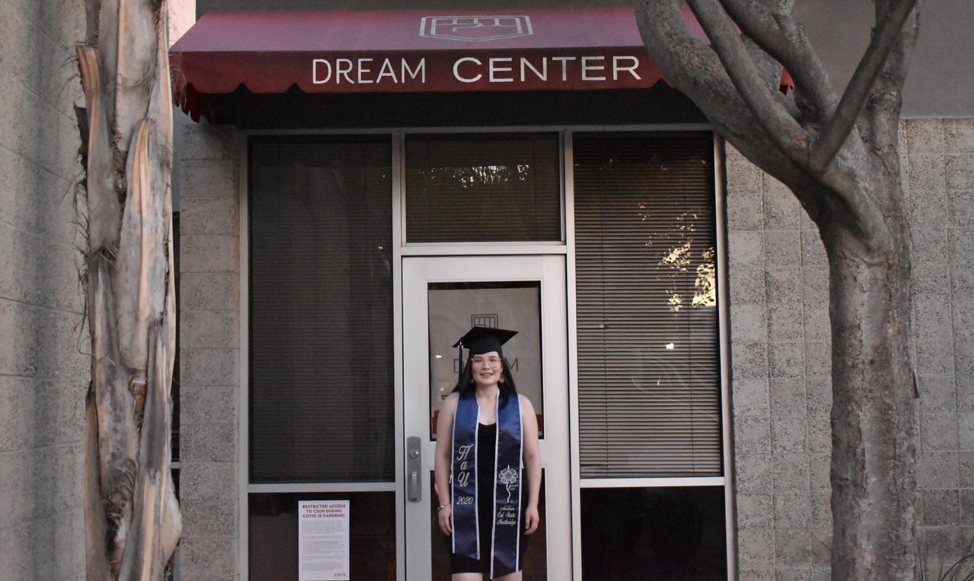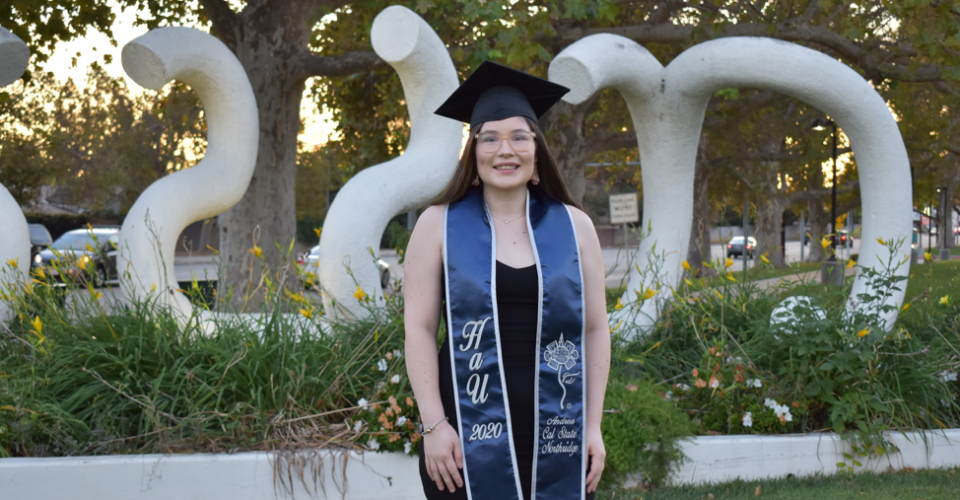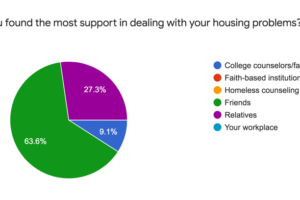“There was not a day when I would take a “me” day,” Andrea says. She loved her family, but she knew she’d never have the space to become the woman she wanted to be if she stayed with them.
By KIMBERLY GARCÍA
EL NUEVO SOL | ETHNIC MEDIA SERVICES
Andrea Reynoso, now 27 and earning a Master’s degree at Cal State Northridge, has lived most of her life without a stable home or legal immigration status. Looking back, she says, the search for both fueled her drive for success and taught her that “a house is not the same thing as a home.”
From an early age, Andrea saw school as a safe space in a turbulent childhood. “When you’re little, you don’t understand the trauma you’re going through. Trauma is what makes or breaks you as an adult,” she reflects.
Although she had a house with both parents and brothers, it never felt like a home because of the arguments. When her parents divorced, Andrea and her brothers eventually wound up living with her father.
It wasn’t until her senior year when she applied for college that she discovered she was undocumented and therefore ineligible for college aid. Andrea credits a teacher who, despite battling cancer, drove her students to visit college campuses and inspired her to “break the generational cycle and educate myself no matter what the sacrifice.”
Family problems almost derailed her goal of going to college. As the only girl in her family, she was expected to fulfil the mom role in her dad’s house—to cook and clean while going to school. Evicted from the trailer home where they lived, the family scrambled before finally finding an apartment. She worked three jobs, established her credit, and helped pay the rent. She also began attending community college.
When Andrea finally entered Cal State Northridge, she’d wake up at 5:40 am to catch two busses to school and work as an after-school program coach before doing household chores. On weekends she worked as a waitress and cleaned houses. “There was not a day when I would take a ‘ME’ day,” she says. She loved her family, but she knew she’d never have the space to become the woman she wanted to be if she stayed with them.
When the owner of one of the houses she cleaned offered her a bedroom rent-free in exchange for keeping house, Andrea lept at the opportunity. “Maria would always help me out – she bought me my first iPad for school, saying ‘This is a gift. You just need to finish college.’”
With a room of her own for the first time, Andrea was able to focus on her education and graduate. She has no resentments. Her parents did their best to provide a home, she says, but neither studied past middle school and both only spoke Spanish.
“Not having parental support during college made me want to cry, but who would I cry to?” she says.
Andrea’s mother, Maria Salazar, says her one regret was not being present enough for her daughter. “I would always pick her up late from school. I worked late and she would wait hours for me after school was over.”

As a proud DACA recipient, Andrea celebrates graduating outside the Dream Center at CSUN. Photo by Kimberly García | El Nuevo Sol.
Andrea aims to become an ethnic studies teacher in high school where she can inspire students by teaching what she calls “the brown side of history.” Today she works as an after-school coach at the same elementary school she attended. Because the pandemic cancelled her graduation last June with a double major in liberal studies and Chicano studies, she says her parents don’t realize the success she has achieved. But now she’s focused on her next goal – getting a Master’s degree and teaching credentials.
Andrea also wants a family. “If I do have kids, I would never put them through anything traumatic. I want a better future, a better support system, more communication, and more affection.” Her deepest desire is to have a stable home—what she wished for growing up–“a beautiful home, under my name, instead of renting here and there in back houses.”
About the author:
 Kimberly García is a Broadcast Journalism major at California State University- Northridge with a minor in Spanish Journalism. She is passionate about the issues surrounding Latinx communities. Representation in the media has always been very important to her. Latinx representation is necessary now, more than ever. In her spare time, you can find her helping her community or spending time with her family. She was born and raised in the San Fernando Valley, surrounded by culture and music. Her passion for journalism guides the way she tells the stories of her community.
Kimberly García is a Broadcast Journalism major at California State University- Northridge with a minor in Spanish Journalism. She is passionate about the issues surrounding Latinx communities. Representation in the media has always been very important to her. Latinx representation is necessary now, more than ever. In her spare time, you can find her helping her community or spending time with her family. She was born and raised in the San Fernando Valley, surrounded by culture and music. Her passion for journalism guides the way she tells the stories of her community.
Tags: Andrea Reynoso CSUN housing insecurity traditional gender roles




















